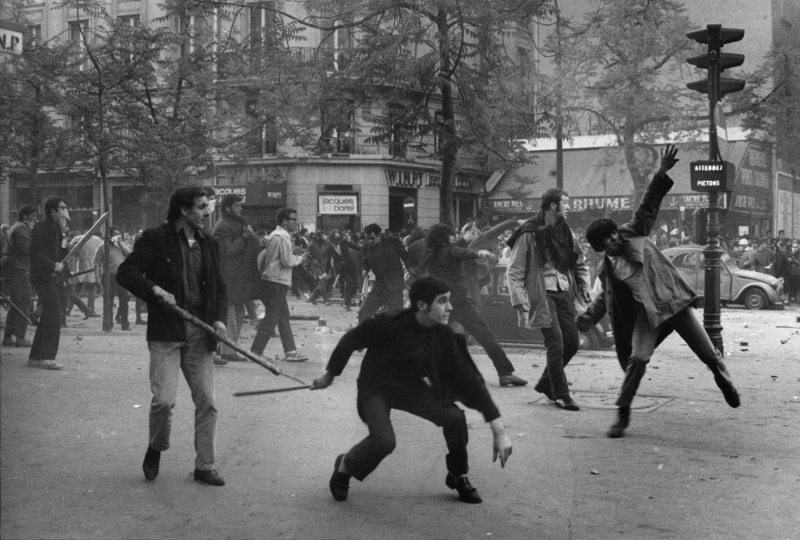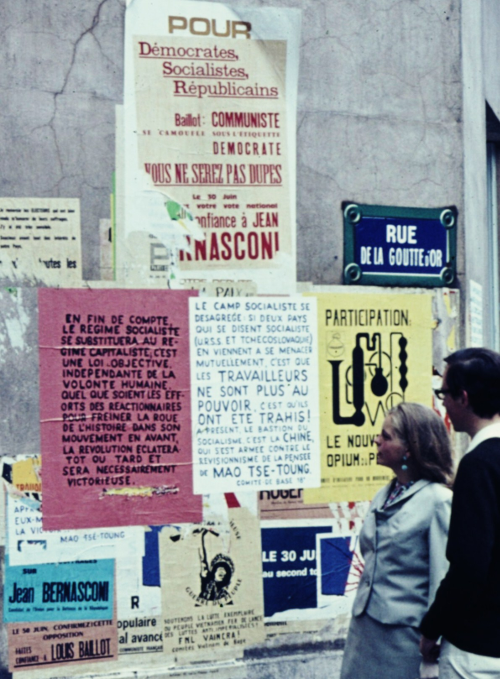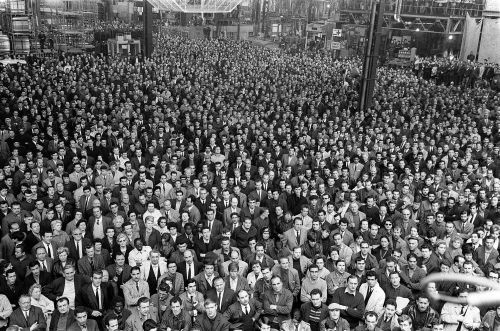MLM Center (B), CPF(mlm) 1968 - 2018 : Maoist Joint declaration, First of May 2018
Submitted by Anonyme (non vérifié)This First of May of this year has a particular significance : 50 years ago happened the student revolt of May 1968 in France, which produced a popular movement all around the country which brought more than ten millions workers to go on strike.
It produced also numerous revolutionary organisations – which historically are summed up onto the label of “Leftism” - trying to relaunch the revolutionary process broken by the triumph of Revisionism, following the Coup in the Soviet Union in 1953. It stood in full convergence, as the revolt of the youth, as the call of Revolution, with the Great Cultural Proletarian Revolution in China.
 The value of May 1968 in France – and also in others countries, with different forms -, the value of the revolutionary experiments of the 1970's in general, the negative aspect of the ideological influences of the petty-bourgeois and the universities (with the students but also the teachers), must be understood in a proper way.
The value of May 1968 in France – and also in others countries, with different forms -, the value of the revolutionary experiments of the 1970's in general, the negative aspect of the ideological influences of the petty-bourgeois and the universities (with the students but also the teachers), must be understood in a proper way.
On this First of May 2018, we call to learn the lesson from the past. The historical value of May 1968 is a part of the world revolutionary heritage, as it shows that, how strong a bourgeois modern society can be in organizing its institutions and its ideological-cultural controls, it is condemned to fail.
There is always a way to break the system maintaining the masses into a passive attitude; there is always a way to open spaces for the revolutionary conscience. In this sense, the main lesson from May 1968 is the workers autonomy, i.e. the autonomy of the working class, the non-dependence to the institutions and in particular of the trade-unions.
The main trade-union, the CGT, dominated by the Revisionist “Communist” Party, played a major role to block the alliance between student and workers, to reduce the struggle to an economical one. It was a part of the institutions in itself. This is the great lesson of May 1968, which corresponds to the changing of form of the bourgeois society since the productive forces have been developed after 1945. This stresses of course the subjective aspect.
 The ability to break with the forms of thinking and acting spread by the bourgeoisie requires a high ideological-cultural level. This was a new situation for the Communists in the imperialist countries. If May 1968 had such an echo, it was also because the Russian October revolution of 1917 and the Chinese Democratic Revolution of 1949 belonged to societies which were not that much developed, both in the biggest country of the World and the most populous country of the World.
The ability to break with the forms of thinking and acting spread by the bourgeoisie requires a high ideological-cultural level. This was a new situation for the Communists in the imperialist countries. If May 1968 had such an echo, it was also because the Russian October revolution of 1917 and the Chinese Democratic Revolution of 1949 belonged to societies which were not that much developed, both in the biggest country of the World and the most populous country of the World.
May 1968 in France appeared, therefore, as a major rupture in a bourgeois modern society, something of a new kind. We must never forget that the rebellious youth understood then that the question was the one of everyday life. Class struggle was not reduced to an economical question, but was understood as it is really : a struggle concerning each aspect of life, because the revolution touches the mode of production, of organizing society, of permitting the faculties of each person to develop themselves.
This is why we say that the key of May 1968 is that the revolutionary Party interacts with the wide masses through the workers autonomy : this was understood in the genuine Maoist experiences after May 1968, in France, in Germany, in Italy, in Belgium. This is the way to build the new state, to organize the rupture at the scale of society with the ruling ideology. This is the real sense of Maoism.
And this real sense was carried by the Red line, on the contrary of the Black Line, which pretended to be anti-Revisionist insofar as it proposed the revolutionary model of the 1920's, when in fact it was a Trade-unionist, Legalist, formalist trend. On this First of May 2018, we call to understand this fact : because of the temporary failure of the Red Line in the 1980's-1990's, the last remains of the Black Line still existing today pretend to have formed in the 1960's-1970's the correct line, to be the real Maoist movement.
This is not true and there is still the need for a “back to the roots” proletarian movement, recuperating the heritage from the past and the Leading Thought which emerged then. We say : there won't be any revolutionary process in any country, if is not understood the two-line struggle from the 1960's-1970's.
 Even if often the Red Line tended to move to subjectivism, it was on the correct path ; the Black Line has nothing to propose but a Neo-Syndicalist, formal, strategy, full of clichés, with absolutely no cultural and ideological value. The French example from May 1968 is here very clear, as there was :
Even if often the Red Line tended to move to subjectivism, it was on the correct path ; the Black Line has nothing to propose but a Neo-Syndicalist, formal, strategy, full of clichés, with absolutely no cultural and ideological value. The French example from May 1968 is here very clear, as there was :
- a Marxist-Leninist Communist Party of France -PCMLF, which was Legalist, Neo-Syndicalist, moving more and more across a lot of splits to Reformism, Hoxhaism, a pro-Deng Xiaoping line ;
- a Union of Young Communists (Marxist-Leninist) – UJC (ml), which became the Proletarian Left – GP, being the most famous organization from the 1960's-1970's because of its activity, its quest for the worker's autonomy.
This two line struggle existed in fact all over the world, for example through the contradiction between the Communist Party of India (Marxist) and the Communist Party of India (MarxistLeninist), the Türkiye İhtilalci İşçi Köylü Partisi and the Communist Party of Turkey / MarxistLeninist, the Revolutionary Youth Movement II and the Revolutionary Youth Movement I, etc.
It was during this two-line struggles that emerged Siraj Sikder, Akram Yari, Ibrahim Kaypakkaya, Gonzalo, Charu Mazumdar… as Guiding Thoughts in their own country.
As we know, the Red Line was not able to succeed in its initiative, even if it marked the history of its country, on the contrary of the Black Line. It is obvious, for example, that even if they failed, the Black Panther Party and the Weathermen marked American History, whereas the Revolutionary Communist Party, USA, did not. The reason for the failure can now be correctly understood, fifty years afterwards.
The Red line, then, overestimated the question of the subjective aspect, believing that the revolutionary process would only be a question of a few years ; it was not before the beginning of the 1980's that appeared the understanding that the revolutionary process would be protracted in itself. The Red Line, also, was not able to recuperate correctly Dialectical Materialism.
 The continuity of Marxism-Leninism defined by Stalin through the Great Cultural Proletarian Revolution, through Maoism, was not apprehended in a proper manner, permitting leftist-subjectivist and rightist-liquidationnist to emerge.
The continuity of Marxism-Leninism defined by Stalin through the Great Cultural Proletarian Revolution, through Maoism, was not apprehended in a proper manner, permitting leftist-subjectivist and rightist-liquidationnist to emerge.
The history of the Red Line is, therefore, often marked by instability and the brutal triumph of liquidationnism. We have to understand that it was the price to pay to discover the new situation.
For this reason, there is no fetishism to be made, neither of May 1968 nor of the experiences made then and afterwards. This would bring in the hands of subjectivism again, even if the main risk, still today and because of the development of the productive forces, is still the loss of the subjective aspect. Here, we have to remember that numerous actors of May 1968 became part of the institutions, especially in the intellectual and cultural fields.
And the modernist part of the bourgeoisie used also the shaking from May 1968 to promote liberalism, individualism, the refusal of any “conservative” value which means of any value at all, etc. Each sequence of class struggle must be properly understood in relationship with the sequences before and after it, and of course with the main goal : the conquest of power.
We say for this reason : let's learn, on this First of May, 2018, from May 1968!
Marxist Leninist Maoist Center of Belgium
Communist Party of France (Marxist-Leninist-Maoist)
